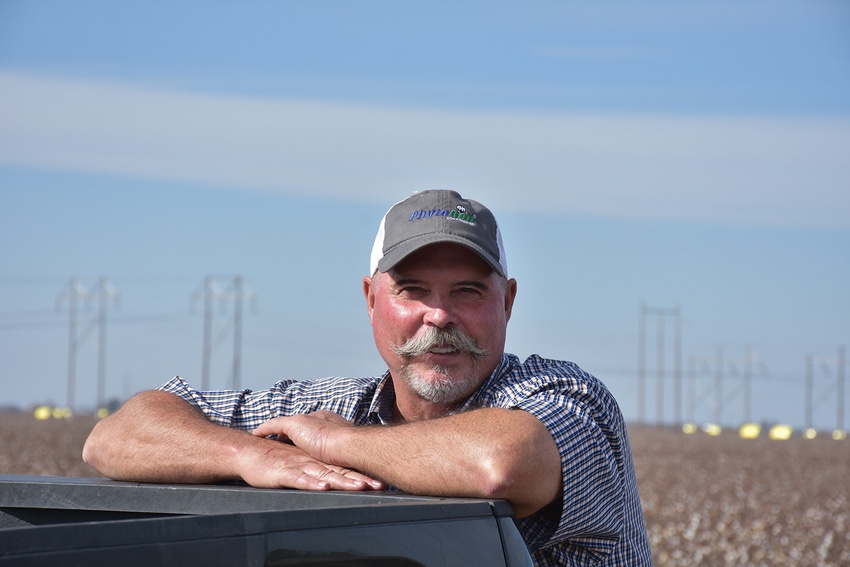
Despite running cotton pickers in the mud, Doug Scott says 2020 turned out a decent harvest for his cotton crop outside of Sikeston, Mo.
When he spoke with Farm Press during harvest, he mentioned that even though he caught a good amount of moisture from several hurricanes out of the gulf, his crop was still picking well.
“First off, no one wants to hear you complain about it,” Scott said. “It is what it is and there’s a lot more people that have faced worse issues than what we have had. And with that, we’ve had a pretty decent crop, in fact a good crop.”
While his attitude was not a foundation for Scott’s selection as the 2021 High Cotton Award winner, it does point to his forward thinking and drive to seek out a way to continually improve his operation.
That drive may have been influenced by his late father, C. G. Scott, who set a tone for innovation and thinking off the farm, interacting with not only other farmers but with other segments of the industry.
“Dad began grading ground in the late 50s,” Scott said. “There are fields that haven’t been releveled since the 50s and 60s. He did a good job.”
The ground was leveled to grade for better efficiency in furrow row irrigation. Scott has touched up some of the fields with a laser level, but many of the fields have not been heavily reworked.
“My dad and grandfather became Pioneer seed dealers in the 60s,” he said. “Locally, no one was dealing hybrid corn. It was new and no one could get their hands on it. That’s how we started selling and dealing with Pioneer.”
That business expanded and as seed technologies increased the number of varieties sold increased. Scott noted they started outselling four varieties, soon it had increased to 20.
Feeling pulled between the seed business and farming, Scott divested from the seed business several years ago and decided to focus primarily on the farm.
Today's operation
If one listens closely, you start to notice that Scott uses words like we and our as he describes his operation. David Blakemore, President of Blakemore Cotton & Grain in Campbell, Mo., who nominated Scott for the High Cotton Award, said that is the way he operates.
Scott’s family and employees respect him and they work together year-round understanding the importance of timely agronomic decisions, according to Blakemore.
With the help of his two sons, Jerod, 32, and Taylor, 26, his wife of 37 years, Tina, and a handful of long term, dedicated employees, Scott farms 4,600 acres of cotton. He also rotates corn and soybeans into the operation.
Starting at 17, he has spent about 40 years farming ground that has been in his family for four generations. Each year brings its own issues. This year weather was one of those challenges.
“There’s a lot of variables you cannot control, so you better do a pretty darn good job on the ones you can control,” Scott said. “The weather can make you look like a fool and it can make you look like a genius. And a lot of times it’s in the same day.”
This year Scott started planting on April 19. Because of wet, cold weather he was not able to finish until June 2.
“Ideally, we’d be looking at a start date of April 25th and finish up by the 20th of May,” he said. “We can make good cotton if it’s in by May 20.
“Actually, we’ve got some good-looking cotton that was planted in June this year. I’m not sure we’ll ever do it again, but we did this year.”
Scott said they never got a good enough window to plant a lot of acres.
“We just never could get a good run,” he said. “Yeah, maybe a day and a half, two days and then it would rain and we’d be out several days. Then we’d get another day or two.”
He said that his other option was to plant soybeans, but low bean prices in late May and early June helped push him to his decision to plant cotton a bit later in 2020.
Good cotton
“We’ve been able to consistently raise good yielding cotton, especially with some of the new varieties and technology,” he said.
The two earlier crops had been particularly good, he notes.
“Our 2018 crop had been the best we’d ever had and then 2019 topped it,” he said.
He plants PhytoGen varieties and the seedling vigor is evident when planting in cooler than normal temperatures. He does grow a breeders’ plot for PhytoGen in addition to a strip variety trial and can see early on which varieties work well in his soil type and weather conditions.
“We switched to PhytoGen several years ago before Enlist ever came out,” he said. “Once we tried it, it was so healthy, yielded well, good fiber quality, a very healthy plant. After trying it for a couple of years, we went 100%.
“It’s just the genetics and it has so much disease defense built in, in addition to root knot nematode, it now reniform defense is built into the seed.”
He mentioned the varieties he likes —PHY 360, PHY 390, PHY 400 and PHY 430.
Tillage work on the many fields he farms depends on the soil and the weather. He tries to keep it at a minimum but hesitates to call it low till or no till.
“I don’t know what you would call it,” Scott said. “The reason I say that is because we have a stalk puller that has been pretty instrumental in what we do and it’s different depending on the field.”
He likes a cover crop but depending on soil type he either broadcasts cover seed on some of the sandier soil that is prone to blow or lets native cover come up. He cuts the cotton stalks and runs a stalk puller.
On a portion of the ground he runs full conventional tillage, but on other ground he does virtually no tillage before coming back in the spring to plant in the cover crop.
New plan
As he was talking about his tillage work, he stopped and chuckled, “I’m saying all that, and then we’re going to totally revamp our tillage system for next year.
“We have tried forever to come up with a system to eliminate stalk shredders. They’re just so high maintenance and expensive. We bought some bedder finishers.”
The Scotts’ intentions are to eventually eliminate all of their hippers, bed conditioners, stalk shredders, and stalk pullers. And, he offers up the caveat — if it works.
“I don’t know if it’s going to work well,” he said. “But we’re intending not to do a thing in our corn ground and cotton until late winter or spring. Then we’ll go in with this tool and run it over the rotted and brittle stubble to break it up — we’ll have a lot of natural cover from winter weeds — and then run this one time and plant.”
To hear Scott tell it, it seems like an abrupt change of direction for his operation, but according to David Blakemore, it’s more likely a well thought out plan determined by a lot of planning and interaction.
“He’s a pioneer,” Blakemore said. “Pioneers break new ground, they lead the way. For their efforts they usually look like pincushions as they’re perfecting the practice so that it can get out to everybody else. Then everyone can use it without going absolutely crazy and trying to debug it.”
Blakemore sites several things that Scott has done to improve his operation and those around him including being one of the first to use soil moisture probes to minimize runoff, using drone imagery to detect pest or nutrient problems in his crop, employing tip shut-off technology on sprayers to minimize drift and overspray and even monitoring photosynthesis to keep track of uptake and deficiencies of nutrients.
Scott and his sons were featured in a series of farm technology videos and articles for Farm Futures in 2018, which followed them over the year as they used several technologies on their equipment to improve efficiencies on their farm. As early adopters of GPS guidance systems and cropping data collection, they worked with John Deere to help put the collected information to use.
For the 2021 season Scott intends to increase his acreage, bumping up his cotton acres to roughly 5,000.
“Weather permitting,” he added.
At one point in Scott’s interview with Farm Press he stopped and asked why he happened to be the one nominated for the High Cotton Award. The modest way he asked the question pointed directly to the reason he was nominated.
Presentation
Join Farm Press and The Cotton Foundation for a livestream presentation of the 2021 High Cotton awards, March 23, 1 p.m. CDT. Farm Press will stream from four locations across the U.S. and recognize each grower/operation. Follow this link for more information.
About the Author(s)
You May Also Like






